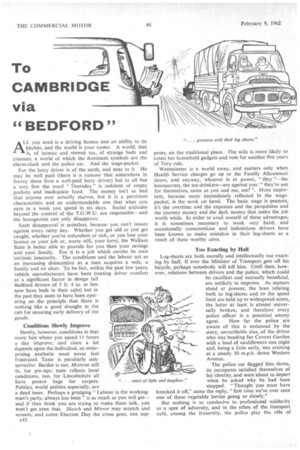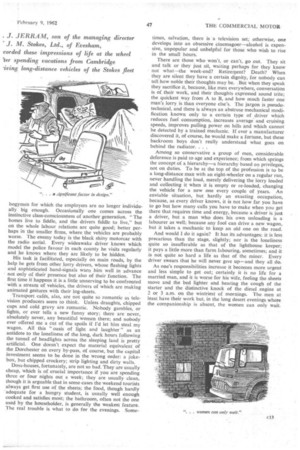To CAMBRIDGE via "BEDFORD"
Page 44

Page 45

If you've noticed an error in this article please click here to report it so we can fix it.
ALL you need is a driving licence and an ability to tie hitches, and the world is your oyster. A world, that is, of tarmac and stewed tea, of strange beds and cinemas; a world of which the dominant symbols are the alarm-clock and the police car. And the wage-packet.
For the lorry driver is of the earth, and near to it. He may be well paid (there is a rumour that somewhere in Surrey there lives a well-paid lorry driver) but to all but a very few the word " Thursday " is redolent of empty . pockets and inadequate food. The money isn't so bad that anyone ever actually starves, but it is a persistent characteristic and an understandable one that what you earn in a week you spend in six days. Social attitudes beyond the control of the T.G.W.U. are responsible—and the bourgeoisie can only disapprove: Such disapprovaf is pointless, because you can't insure against every rainy day. Whether you get old or just get caught, whether you're redundant or sick, or you lose your licence or your job or, worse still, your lorry, the Welfare State is better able to provide for you than your savings and your family. For it is a job which carries its own intrinsic insecurity. The conditions and the labour act as an increasing disincentive as a man acquires a wife, a family and an ulcer. To be fair, within the past few years, vehicle manufacturers have been treating driver comfort as a significant factor in design (all Bedford drivers of 5 ft. 4 in. or less now have beds in their cabs) but in the past they seem to have been operating on the principle that there is nothing like a good draught in the cab for ensuring early delivery of the goods.
Conditions Slowly Improve Slowly, however, conditions in that noisy box where you spend 11 hours a day improve; and since a lot depends upon the individual, an enterprising aesthetic need never feel frustrated. Taste is peculiarly conservative: Bardot is out, Monroe still in, for pin-ups; taste reflects local conditions, too, for Lincolnshire all have potato bags for carpets. Politics, world politics especially, are a dead issue. Perhaps a grudging " Labour is the workingman's party, always has been" is as much as you will get— and if they think you are trying to make them talk, you won't get even that. Sketch and Mirror may scratch and scream, and come Election Day the cross goes, one sup
poses, on the traditional place. The wife is more likely to count her household gadgets and vote for another five years of Tory rule.
Westminster is a world away, and matters only when Health Service charges go up or the Family Allowances down, and anyway, whoever is in power, "they "—the bureaucrats, the tea-drinkers—are against you: "they're out for themselves, same as you and me, see? ". More important, because more immediately reflected in the wagepacket, is the work on hand. The basic wage is peanuts, it's the overtime and the expenses and the perquisites and the journey money and -the dark money that make the job worth while. In order to avail oneself of these advantages, it is sometimes necessary to work very hard; and occasionally conscientious and industrious drivers have been known to . make mistakes in their log-sheets as a result of these worthy aims.
Too Exacting by Hall
Log-sheets are both morally and intellectually too exacting by half. If ever the Minister of Transport gets off his bicycle, perhaps somebody will tell him. Until then, however, relations between drivers and the police, which could be excellent and mutually beneficial, are unlikely to improve. As matters stand at present, the laws relating both to log-sheets andto the speed limit are held up to widespread scorn, the latter at least is almost universally broken, and therefore every police officer is a potential enemy agent. How far the police are aware of this is instanced by the story, unverifiable alas, of the driver who was heading for Covent Garden with a load of cauliflowers one night and, being a little early, was cruising at a steady 30 m.p.h. down Western Avenue.
The police car flagged him down, its occupants satisfied themselves of his identity, and were about to depart when he asked why he had been stopped. "Thought you must have knocked it off," came the reply, "first time we've ever seen one of these vegetable lorries going so slowly."
But nothing is so conducive to professional solidarity as a spot of adversity, and in the ethos of the transport café, among the fraternity, the police play the role of
. oasis of light and laughter."
bogymen for which the employers are no longer individually big enough. Occasionally one comes across the instinctive class-consciousness of another generation. "The bosses live to fiddle, and the drivers fiddle to live," but on the whole labour relations are quite good; better perhaps in the smaller firms, where the vehicles are probably worse. The enemy today is the black shiny motorcar with the radio aerial. Every wideawake driver knows which model the police favour in each county he visits regularly and he knows where they are likely to be hidden.
His task is facilitated, especially on main roads, by the help he gets from other lorry drivers, whose flashing lights and sophisticated hand-signals warn him well in advance not only of their presence but also of their function. The first time it happens it is a little unnerving to be confronted with a stream of vehicles, the drivers of which are making animated gestures with their log-sheets.
Transport cafds, alas, are not quite so romantic as television producers seem to think. Unless draughts, chipped cups and cold gravy are romantic. Nobody gambles, or fights, or ever tells a new funny story; there are never, absolutely never, any beautiful women there; and nobody ever offered me a cut of the spoils if I'd let him steal my wagon. All this "oasis of light and laughter" as an antidote to the loneliness of the long, dark hours following the tunnel of headlights across the sleeping land is pretty artificial. One doesn't expect the material equivalent of the Dorchester on every by-pass, of course, but the capital investment seems to be done in the wrong order: a jukebox, but chipped crockery; strip lighting and dirty walls.
Doss-houses, fortunately, are not so had. They are usually cheap, which is of crucial importance if you are spending three or four nights out a week; they are usually clean, though it is arguable that in some cases the weekend tourists always get first use of the sheets; the food, though hardly "adequate for a hungry student, is usually well enough cooked and satisfies most; the bathroom, often not the one used by the householder, is generally the weakest feature. The real trouble is what to do for the evenings. Some times, salvation, there is a television set; otherwise, one develops into an obsessive cinemagoer—alcohol is expensive, unpopular and unhelpful for those who wish to rise in the small hours.
There are those who won't, or can't, go out. They sit and talk or they just sit, waiting perhaps for they know not what—the week-end? Retirement? Death? When they are silent they have a certain dignity, for nobody can tell how noble their thoughts may be. But when they speak they sacrifice it, because, like men everywhere, conversation is of their work, and their thoughts expressed sound trite; the quickest way from A to B, and how much faster one man's lorry is than everyone else's. The jargon is pseudotechnical, and there is always an abstruse mechanical modification known only to a certain type of .driver which reduces fuel consumption, increases average and cruising speeds, improves pulling power on hills and which cannot be detected by a trained mechanic. If ever a manufacturer discovered it, of course, he would make a fortune, but these backroom boys don't really understand what goes on behind the radiator. . . .
Among so conservative a group of men, considerable deference is paid to age and experience; from which springs the concept of a hierarchy—a hierarchy based on privileges, not on duties. To be at the top of the profession is to be a long-distance man with an eight-wheeler on a regular run, never handling the load, merely delivering the lorry loaded and collecting it when it is empty or re-loaded, changing the vehicle for a new one every couple of years. An enviable situation, but hardly an exacting occupation, because, as every driver knows, it is not how far you have to go but how many calls you have to make when you get there that requires time and energy, because a driver is just a driver, but a man who does his own unloading is a labourer as well; because any fool can drive a new wagon, but it takes a mechanic to keep an old one on the road.
And would I do it again? It has its advantages: it is less precarious than the stage, slightly; nor is the loneliness quite so insufferable as that of the lighthouse keeper; it pays a little more than farm labouring, sometimes; and it is not quite so hard a life as that of the miner. Every driver swears that he will never give up----and they all do.
As one's responsibilities increase it becomes more urgent and less simple to get out; certainly it is no life for a married man, and it is worse for his wife, feeling the sheets move and the bed lighter and hearing the cough of the starter and the distinctive knock of the diesel _engine at 2 or 3 a.m. on the wintriest of mornings. The men at least have their work but, in the long desert evenings where the companionship is absent, the women can only wait.
















































































































